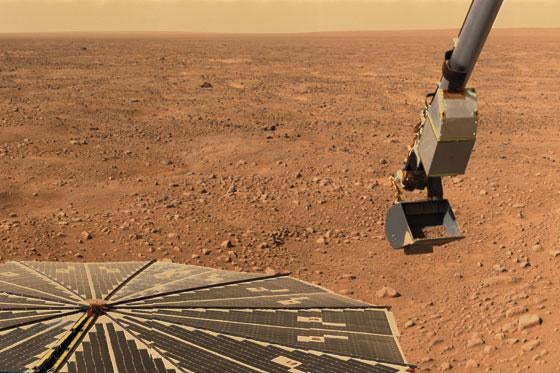
• Sun denies breaking embargo on Mars gas discovery story
• US science newswire bans tabloid for six months
• Committee to discuss the way embargoes work
A review of the protocol surrounding journalistic embargoes has been launched, after The Sun was accused of breaking an embargo with its ‘life on Mars’ front-page splash.
A committee of journalists has been formed to review the guidelines that apply to material released in advance to the media – focusing specifically on science reporting.
It comes after the US-based science and technology news service EurekAlert claimed that the “life on Mars” scoop published in The Sun last week was the result of an embargo break.
Sun journalist Paul Sutherland, whose front-page splash revealed that Nasa had discovered methane gas on Mars, told Press Gazette it was the result of “good old-fashioned journalism”.
He said he used information readily available from Nasa to break the story about the discovery before other news organisations, which had received an embargoed press release.
But EurekAlert has told Press Gazette that it has now applied a sanction against The Sun, banning it from receiving any embargoed releases for six months.
‘Journalists should have some say’
The embargo review, proposed by ITV News health and science editor Lawrence McGinty, was announced at the annual general meeting of the Association of British Science Writers in London earlier this week.
McGinty described embargoes as “strange beasts”. He told Press Gazette: “It is about time we sort out our position as journalists about these.”
He added that there was now an increasing number of stories from journals, charities, the Government and PR agencies released under embargo.
“I don’t want a debate on whether journalists should participate in them – that would be academic because they are here to stay. But I do feel that journalists should have some say in how embargoes work,” McGinty said.
“For example, I don’t think it’s acceptable that you can be struck off a mailing list because someone thinks you have broken an embargo, with no appeal and no independent ‘hearing’.”
‘Over-draconian about embargoes’
The EurekAlert ban imposed on The Sun will not apply to its sister papers within News International – the News of the World, Times, Sunday Times and thelondonpaper.
The Association of British Science Writers (ABSW) said this approach was inconsistent with previous rulings, when whole news organisations had been affected by a sanction, even when only one of its newspapers allegedly breached an embargo.
ABSW chairman Ted Nield said that such inconsistencies highlighted “a tendency to be over-draconian about embargoes and apply the sanctions very arbitrarily, with a broad brush and in a less than sensible way”.
He added that it was “absurd and unrealistic” that some embargoes stipulate that journalists cannot share the privileged information with colleagues with whom they are working on a story.
“It bears no relation to the way that journalism works,” he told Press Gazette.
‘Tremendously inconvenienced’
Ginger Pinholster of the American Association for the Advancement of Science, the body which sponsors EurekAlert, said she could not make a “blanket statement’about whether the organisation would support the findings of the committee’s embargo review.
Asked about the sanction on The Sun, she told Press Gazette: “When we make an embargo-related decision we are very willing to re-evaluate it.
“I’m sorry that this tabloid is upset – but we have had many complaints from other [news organisations] who were tremendously inconvenienced and placed at a disadvantage.”
The Association of British Science Writers has stressed that the newly formed committee on embargoes is not a way of “declaring war” with news services such as EurekAlert and AlphaGalileo, a European science research news website.
Nield said he hoped the committee could work with news services to build a consensus that will “move a little bit further in the direction of the journalist and away from the power in the hands of the producer”.
The announcement of the embargo review was well received at the ABSW meeting. Nield said that many of the group’s members felt that “the powers of embargoes wielded by journals through gateways such as EurekAlert has become overweaning”.
A draft report of the committee’s findings will be discussed at this summer’s World Conference of Science Journalists, to be held in London at the end of June.
Email pged@pressgazette.co.uk to point out mistakes, provide story tips or send in a letter for publication on our "Letters Page" blog
